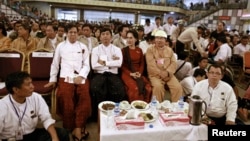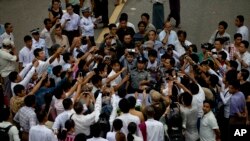Burma's ruling party has for the first time joined public commemorations of the 1988 pro-democracy uprising that the military crushed.
Ruling party vice-chairman and former general Htay Oo joined pro-democracy activist Aung San Suu Kyi and a crowd of more than 5,000 at an event in the Myanmar Convention Center in Rangoon Thursday.
Min Ko Naing, a prominent student leader in 1988, spoke at the commemoration.
Min Ko Naing, a prominent student leader in 1988, spoke at the commemoration.
"For a time period, those who hold power could portray or write the history as what they want. But the truth would be revealed at last. It shows that how courageous people those joined today commemorate this special day,” the student leader said.
It is a huge shift from previous years, when the military government banned any public mentions of the bloody 1988 crackdown, in which more than 3,000 people died.
Since a nominally civilian government took power in 2011, Burma has released hundreds of political prisoners, reduced government censorship, and allowed democracy icon Aung San Suu Kyi to successfully run for parliament.
Earlier, activists laid wreaths at Rangoon's Sule Pagoda, the site of the initial crackdown. Dozens of protesters also marched peacefully through Rangoon.
Mark Farmaner of the Burma Campaign UK says despite recent reforms, Burma's government has never held accountable those responsible for the deaths.
"The government, the military, and President Thein Sein himself are not acknowledging that what happened was wrong, and they're not revealing what their own role was. There is no process of justice, accountability, truth or reconciliation at all," he said.
However, Farmaner said that increased openness is reflected in the government's willingness to allow what he calls unprecedented commemorations of the 1988 protests.
"It's one of the paradoxes that you've got in Burma at the moment. Basically, you've got the same people in charge, and you've got many of the same issues - people arrested for peacefully protesting, the Burmese army still attacking ethnic minorities," he explained. "Yet at the same time they're allowing more freedom of expression, there's a bit more political space in the country. People can talk more openly about the problems, but at the same time those problems are not being fully addressed."
Earlier this week, Human Rights Watch called on President Thein Sein to commit to an independent investigation and prosecution of those responsible for the deaths.
The New York-based group called the issue an "unaddressed open wound that challenges the government's rhetoric of reform." It said addressing the abuses is "absolutely necessary for Burmese society to move forward."
This report was produced in collaboration with the VOA Burmese service










